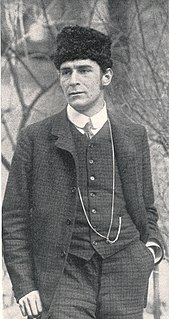A Quote by Ayn Rand
You know what you are actually in love with? Integrity. The impossible. The clean, consistent, reasonable, self-faithful, the all-of-one-style, like a work of art.
Quote Topics
Related Quotes
To paraphrase the late management thinker and writer, Peter Drucker, thinking is hard work, which is why so few people (including actually senior managers) do it. Once there is some "conventional," seemingly-reasonable story, people just accept it and don't ask, "is this actually true? Is it consistent with the data?" And this extends to the highest reaches of organizational life.
Those who have overcome self-will and become instruments to do God's work can accomplish tasks which are seemingly impossible, but they experience no feeling of self achievement. I now know myself to be a part of the infinite cosmos, not separate from other souls or God. My illusory self is dead; the real self controls the garment of clay and uses it for God's work.
Our time and attention is scarce. Art is not that important to us, no matter what we might like to believe... Our love of art is often quite temporary, dependent upon our moods, and our love of art is subservient to our demand for a positive self image. How we look at art should account for those imperfections and work around them. Keep in mind that books, like art museums, are not always geared to the desires of the reader. Maybe we think we are supposed to like tough books, but are we? Who says? Many writers (and art museums) produce for quite a small subsample of the... public.
I'm not that complicated as an actor. I have a formula in which I work, yeah. But not like Sean Penn does. Sean is one of the few actors I know who can work like that, actually becoming the character he is playing, and get consistent results. I don't believe you can ever be someone else. You manifest different levels of your own personality to come up with a character.
Much good art got made while money ruled; I like a lot of it, and hardship and poverty aren't virtues. The good news is that, since almost no one will be selling art, artists - especially emerging ones - won't have to think about turning out a consistent style or creating a brand. They'll be able to experiment as much as they want.
Oddly enough, I suppose, I don't give much thought to my style, and I don't attempt to be consistent - except within a story. You ask if I struggled to find my style. It seems to me that style - in other words, a way of thinking and doing things - is innate. You can try to will it to be different, but it's like a signature - you can't change its fundamental nature.




































